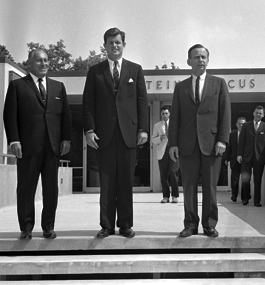Ted Kennedy’s Lessons in Life and Death

Courtesy Farber University Archives, Brandeis
YOUNG LION: Ted Kennedy first visited Brandeis in 1961, the year before he joined the U.S. Senate, filling his brother John's seat.
by Eileen McNamara
Every third person in Massachusetts must have a Ted Kennedy story. How could it be otherwise, given the Democratic stalwart’s 47-year reign representing the state in the United States Senate?
When the Edward M. Kennedy Institute for the United States Senate opened in Boston in March, President Obama and other speakers recalled the youngest of Joseph P. and Rose Fitzgerald Kennedy’s nine children as the “liberal lion” of the Senate, a Democrat who reached across the aisle to build the kind of bipartisan coalitions we rarely see now. He was also a teacher of history and politics, a role the new institute on Columbia Point celebrates.
I have my own Ted Kennedy-as-tutor story, which unfolded on Christmas 30 years ago in sub-Saharan Africa. He was the state’s senior senator. I was The Boston Globe’s neophyte congressional correspondent. I had covered his floor speeches, called him for comment when the occasion warranted, sometimes shared the row with him on the New York Air shuttle up to Boston on Friday nights. I kept a professional distance, in the manner of most post-Watergate reporters trained to be wary of those with power.
I did not expect the reporting dynamic to be much different when, in December 1984, Kennedy and staffers from the Senate subcommittee he chaired on immigration and refugee affairs flew to Ethiopia to investigate famine conditions that had just been exposed by the BBC. I went along, too.
A young career had not prepared me for the scenes we encountered on the drought-stricken Horn of Africa. I did as directed when a U.S. Foreign Service officer warned me not to cry as I watched dozens of children being wrapped in empty grain sacks for burial in shallow graves scratched by hand in the sand. “It’s not your tragedy,” he said. “You get to fly out of here.” I followed the instructions of the Red Cross nurse who told me not to let the hollow-eyed mothers in the refugee camps hand me their babies. “They’re already dead,” she said. “If you take them, you are giving those mothers false hope.”
My detachment cracked on the northern border with Sudan, where our small party had traveled by Land Rover to confirm reports that thousands of refugees fleeing Ethiopia were overwhelming a relief station manned by Doctors Without Borders. Long before we saw the camp, we saw the refugees, endless lines of mostly women and children streaming across the white-hot desert, many collapsing and dying where they fell.
Sudanese soldiers tried to turn them back, but the river of humanity kept coming, unaware that there was neither water nor food to sustain them in a parched landscape that recognized no man-made borders.
“Back in the jeeps,” Kennedy barked after an hour of conversation with a French doctor and a Canadian nurse established that things were even worse than they appeared. The first American transport plane to airlift emergency supplies into Sudan that week had carried only water containers and tents. The only delivery on Christmas Day was 6,000 pairs of purple trousers from a relief agency, offering what it had.
I was incredulous. “He’s just going to drive away,” I all but shouted at one of the senator’s aides. Behind me, I heard the unmistakable voice of the senator himself. “Let’s take a walk,” he said, leading me out into the desert away from the arriving refugees. If he did not seem shocked by what we were seeing, he said, it was because he had seen it before. In Bangladesh. In Vietnam. In Cambodia.
“This is the job,” he said sternly but not without compassion. “It isn’t about you, and it isn’t about me. You write about it. Maybe your story moves someone. I go back to the Senate and maybe I convince my colleagues to release enough money to help fix it. That’s what we can do. What we can’t do is fit them all in the jeep.”
That Christmas night, the pilot of the small plane that had flown us into Sudan took me up alone to use his radio to patch me through to The Boston Globe so that I could dictate my report about what was unfolding on the ground.
Later, back in Khartoum, Ted Kennedy strode across the hotel lobby, clutching a batch of telexes he had just received from his Washington office. “I’ve just been reading the dispatches you’ve been sending, and I can’t help but notice that I get barely a mention,” he said.
That’s true, I replied. “This story isn’t about us, remember? You taught me that.”
Eileen McNamara is professor of the practice of journalism at Brandeis. A longer version of this essay was originally published on Cognoscenti, wbur.org’s ideas and opinion page. It is reprinted here with permission.
